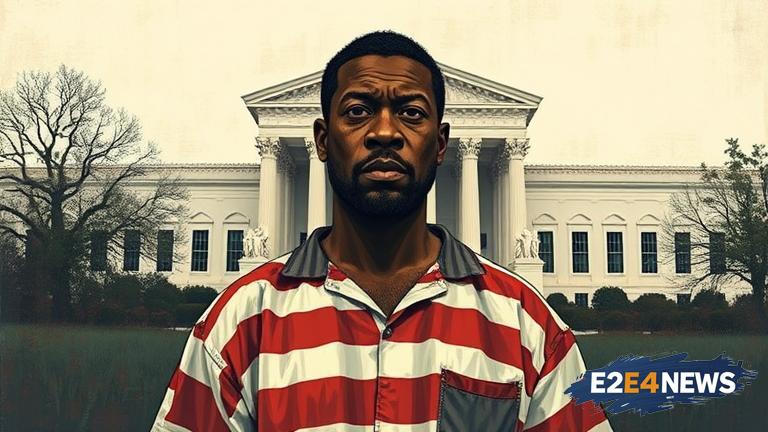The US Supreme Court has made a significant decision in the case of Byron Black, a Tennessee death row inmate who had appealed his execution due to concerns over his disability and the potential use of a defibrillator during the execution process. Black, who has been on death row for over 30 years, had argued that his execution would be unconstitutional due to his intellectual disability and the risk of pain and suffering associated with the use of a defibrillator. Despite these concerns, the Supreme Court has denied Black’s appeals, paving the way for his execution to proceed. The decision has sparked controversy and debate over the use of the death penalty in the United States, particularly in cases where the inmate has a disability or other underlying health conditions. Black’s case has also raised questions about the effectiveness of the appeals process and the ability of inmates to challenge their executions on constitutional grounds. The use of a defibrillator during an execution is a relatively new development, and its implications are still not fully understood. Some experts have argued that the use of a defibrillator could potentially prolong the execution process and increase the risk of pain and suffering for the inmate. Others have argued that the defibrillator is a necessary precaution to ensure that the execution is carried out humanely. The Supreme Court’s decision in Black’s case is likely to have significant implications for the future of the death penalty in the United States. It is likely to be seen as a setback for advocates of death penalty reform, who have argued that the practice is inhumane and disproportionately affects marginalized communities. The decision is also likely to be seen as a victory for proponents of the death penalty, who argue that it is a necessary tool for maintaining public safety. As the debate over the death penalty continues, it is likely that Black’s case will be cited as an example of the need for reform. The case has also highlighted the importance of considering the human rights and dignity of inmates on death row, particularly those with disabilities or other underlying health conditions. In recent years, there has been a growing trend towards abolishing the death penalty, with several states having repealed the practice in recent years. However, the practice remains in place in many states, including Tennessee, where Black is being held. The use of the death penalty is a complex and contentious issue, with proponents arguing that it is a necessary tool for maintaining public safety, while opponents argue that it is inhumane and ineffective. As the debate continues, it is likely that Black’s case will be seen as a significant milestone in the ongoing discussion over the future of the death penalty. The case has also raised questions about the role of the Supreme Court in shaping the nation’s death penalty laws. The Court’s decision in Black’s case is likely to be seen as a significant departure from its previous rulings on the subject, which have generally emphasized the need for caution and restraint in the application of the death penalty. The decision is also likely to be seen as a reflection of the Court’s increasingly conservative leanings, which have been evident in several recent rulings on contentious issues. As the nation continues to grapple with the complexities of the death penalty, it is likely that Black’s case will be remembered as a significant turning point in the ongoing debate. The case has also highlighted the importance of considering the perspectives of all stakeholders, including inmates, their families, and the broader community. It is likely that the decision will have significant implications for the families of victims, who may be affected by the execution of the inmate. The case has also raised questions about the role of the media in shaping public opinion on the death penalty, with many outlets having covered the story in detail. The use of social media has also played a significant role in the case, with many people having taken to Twitter and other platforms to express their opinions on the matter. As the debate continues, it is likely that the use of social media will play an increasingly important role in shaping public opinion on the death penalty. The case has also highlighted the importance of considering the international implications of the death penalty, with many countries having abolished the practice in recent years. The United States is one of the few developed countries that still practices capital punishment, and the decision in Black’s case is likely to be seen as a significant departure from international norms. The case has also raised questions about the role of the United Nations and other international organizations in shaping the nation’s death penalty laws. The use of the death penalty is a complex and contentious issue, and it is likely that Black’s case will be remembered as a significant milestone in the ongoing debate.





